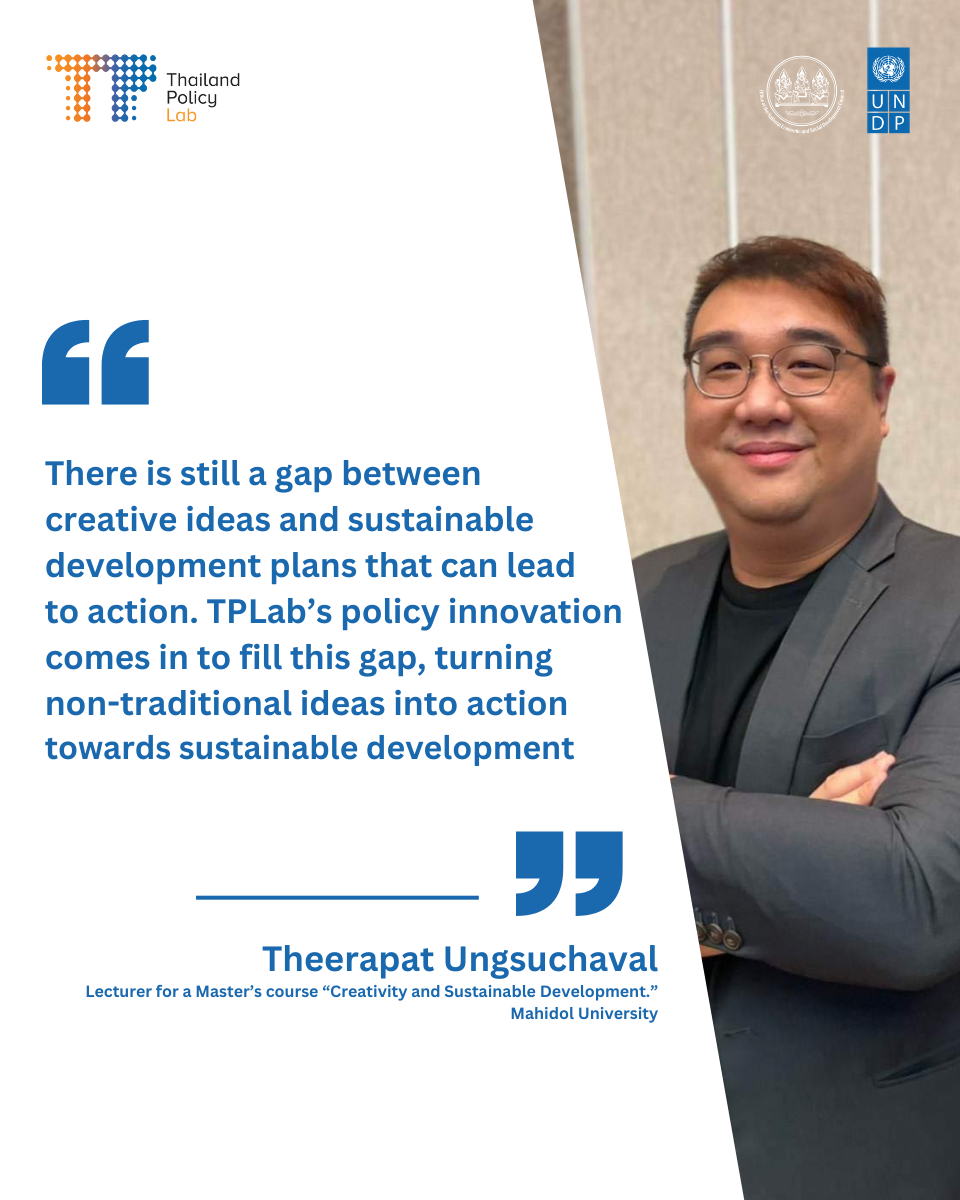Besides working with Thammasat University, Thailand Policy Lab had the chance to co-design a public policy curriculum with the Public Administration Department, Mahidol University, for a Master’s course “Creativity and Sustainable Development.” The course is designed for master’s students to go on field study to lay the theoretical groundwork, together with building understanding of actual policymaking in the current world full of complexity.
With his decade-long expertise in the status and trends in public policy, Theerapat Ungsuchaval, the lecturer of “Creativity and Sustainable Development” course, systematically designs his public policy program out-of-the-box which is the opposite of how public policy is conventionally taught in Thailand as a tool for government officials. He turns that into a course that attempts to understand the genealogy of public policy knowledge in Thailand and the more interdisciplinary policy making in an uncertain world we currently live in.
“Conventional” public policy
Theerapat explains that public policy studies is generally divided into two: policy analysis that emphasises policy recommendations and policy process that emphasises political relations. Most public policy programs in Thailand focus on policy analysis but they tend to be limited to the discipline of public administration while, globally, public policy is interdisciplinary.
“Limiting a subject that its heart lies in interdisciplinary studies to a single discipline creates knowledge stagnation,” he points out, “nothing is wrong with teaching public policy within public administration, but limiting the study just within this discipline can stall knowledge development. We should teach public policy via public administration and other disciplines – knowledge should not be monopolised by a field of study.”
This is where the Thailand Public Policy Network shares a common ground. The network has been hosting seminars focusing on the interdisciplinary aspect of public policy studies and disseminating academic works that are creative, sustainable, and justice-oriented to expand the horizon of public policy knowledge in Thailand.
Apart from building a network of academics and policy makers, creating and developing a curriculum for younger generation policymakers to understand the policy process in an acceleratedly complex world is equally important. Theerapat invited TPLab and Act Lab to co-design his “Creativity and Sustainable Development ” course for master’s students in public administration last summer.
“Get out of the box” with policy innovation
“After inviting TPLab and Act Lab, we spent 6-7 months together to design the course,” says Theerapat, “we did not add the word policy innovation into the course’s name but this was TPLab’s strength so I mulled over that and finally came to conclusion that policy innovation, creativity, and sustainable development were all interconnected.”
“Creativity in the eyes of the government tends to be about economic growth like creative economy but in terms of public policy, creativity has the power to create social change and bring about justice.”
“Creativity is doing things differently. It is how we train people to think out of the box. Creativity, at times, is how we go against the entrenched social norms like how we always do policy and offer solutions. It is to stand at the opposite of red tape culture and existing power structure.”
“Creativity is thus essential to sustainable development but there is still a gap between creative ideas and sustainable development plans that can lead to action. TPLab’s policy innovation comes in to fill this gap, turning non-traditional ideas into action towards sustainable development.”
The course is elective and not restrained by knowledge standard framework, lecturer and the labs were thus able to translate the aforementioned ideas into a curriculum: online lectures on weekdays’ evening and Saturday workshop on policy tools with TPLab. This is together with Act Lab that brought the students to Pleanyodtarn community and to the President of the Motorcycle Taxi Association, to understand the entrenched inequality, and to use the policy tools to think creatively and empathetically.
Creating needed skills in the world of complex policymaking
In the world of complex policymaking, policymakers have to be equipped with policy analysis skills to understand each policy option, management and administration skills, and policy acumen skills to balance between what matters and what works.
“If you simply care about what works, you would plan to grow 100 plants and do that, but you also need to question whether it responds to the issue in question, or do you know other case studies you can learn from? This is difficult to teach and depends on experience.”
“But we can teach this a little bit in the course when we go on field study. TPLab’s policy innovation tools also build the analytical skills for students. Once they are equipped with these, they are prepared to wade into the multidisciplinary public policy world,” Theerapat concludes.

